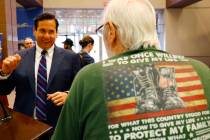Taxpayers would pay the bill if Obamacare insurance CO-OP fails
What could be more frustrating than trying to buy coverage through the Silver State Health Insurance Exchange?
Trying to sell it.
That’s the challenge Nevada’s insurers face these days. Thanks partly to an ongoing series of website glitches, consumers have been slow to buy plans through the exchange, with Gov. Brian Sandoval reporting just 513 enrollments as of Tuesday. But low enrollment could hurt one insurer more than others.
Nevada Health CO-OP, a startup insurer created by the Affordable Care Act to compete on the exchange with big insurers such as UnitedHealth Group and Anthem Blue Cross Blue Shield, is watching enrollment carefully. With five months left for consumers to sign up, it’s too early to panic. But CO-OP executives admit they have an uphill climb because of marketing restrictions and administrative barriers that other insurers don’t face.
“I feel like we’re in pretty good shape because we have some important tools in place,” said Bobette Bond, the nonprofit’s chief project officer. “But that doesn’t mean we have this licked. We are very aware of our underdog status.”
Why does the CO-OP’s underdog position matter to you? If it fails, all taxpayers will be on the hook for nearly $66 million in federal loans used for its startup.
More importantly, the CO-OP’s demise would reduce competition among insurers, and it would shutter Southern Nevada’s only local nonprofit carrier.
To understand where it might be headed, consider how the CO-OP got started. Every state has an insurance exchange through which consumers can buy plans to comply with Obamacare’s individual coverage mandate. On top of creating exchanges, the Affordable Care Act set aside funding for CO-OPs, or consumer operated and oriented plans. The CO-OPs are member-run insurance groups designed to keep premiums down, said Karen Davis, director of the Roger C. Lipitz Center for Integrated Health Care at the Johns Hopkins Bloomberg School of Public Health. In Nevada, the CO-OP is one of four insurers selling on the state exchange. The others are UnitedHealth, Anthem and Reno-based St. Mary’s.
Bond said early Tuesday that the state exchange hadn’t sent the CO-OP an enrollment breakdown by insurer. But website issues, including error codes and frozen screens, may be hurting enrollment in general, exchange officials have acknowledged. An exchange spokesman told the Review-Journal last week that it can take 30 minutes to two hours to complete a single application.
That could mean slow going for the CO-OP, which had initially targeted 30,000 members in its first year, though Bond says the nonprofit could “live on a lot less.” Enrollment matters because insurers need a big enough base to spread risk, and to be “taken seriously” by providers during reimbursement negotiations, Davis said.
Nevada Health CO-OP isn’t the only nonprofit with issues. Twenty-three CO-OPs took out $1.98 billion in federal loans to open in 24 states. The U.S. Department of Health and Human Services said in July that 11 of 16 CO-OPs it studied had higher startup costs than their initial loans could cover, and if enrollment fell short, they could burn through their seed money before having operating income to stand on their own.
The department didn’t identify the 11 CO-OPs, but Davis said similar problems have plagued nearly all.
To begin with, they all started with loans rather than grants and must pay back their seed money. Nevada Health CO-OP has to start making payments in five years. A spokesman with the Centers for Medicare & Medicaid Services told the Review-Journal in 2012 that interest rates would track Treasury rates and be “very low.”
Nor is consumer bewilderment about insurance exchanges helping, Bond said.
“People are just so confused about the exchanges and where they should go to buy coverage. A lot of people are sitting back, waiting for things to get fixed,” she said. “There’s been so much bad press nationally.”
The Affordable Care Act bans CO-OPs from using federal seed money for marketing. That makes it all the more difficult to go up against commercial carriers with marketing budgets worth hundreds of millions of dollars, Bond said.
“We’ve got a minuscule amount of money compared to the insurance giants,” Bond said. “We just have to be very smart and work very hard to get our name out there, and that’s what we’re doing.”
Local brokers say the CO-OP has a long way to go in building its brand.
“I think there’s certainly a bit of an identity crisis there,” said Rick Krause, vice president of employee benefits for Las Vegas insurance broker Kaercher Campbell and Associates. “It’s not something that I think has taken hold and shown any kind of competitive strength as it relates to other carriers.”
But it’s early, CO-OP officials say, and they said they’re doing what they can to get things moving. The nonprofit’s sponsors include the Culinary Health Fund, the fund’s national parent UNITE HERE Health, and the Health Services Coalition, a local consumer advocacy group that negotiates costs for more than 300,000 members covered by government, unions and big companies. The CO-OP has started fundraising to pay for marketing through the Health Services Coalition. It released its first TV ads the first week in November.
Plus, the CO-OP put a lot of effort into designing a functional website that works on- or off-exchange, Bond said. She added that insurance brokers tell her the CO-OP’s online subsidy calculator is considerably easier to use than the state exchange’s version.
The nonprofit will also open a walk-in customer service center at its Meadows Lane office in the next two weeks, which should make it easier to reach out to potential members.
Management and policy tweaks could make a difference, too, Davis said. The CO-OPs most likely to make it will be the ones with their own health-care delivery system, so their best bet might be to band together with existing low-cost health clinics to create operational efficiency. And it might help to require hospitals, doctors and pharmaceutical companies to give CO-OPs the same lower prices they grant big commercial insurers.
Even if some of those changes happen, it could take three to five years to know whether the CO-OPs can stay open, Davis said.
Nevada Health CO-OP is ready to hunker down and stay “pretty lean” for the next few years to make it work, Bond said.
“We’re as concerned (about surviving) as we were the day we wrote the application,” she said. “This is very much an experiment, and very much a great idea. It’s a wonderful way to bring competition into the exchanges, and it’s the only way a nonprofit can start up, because of solvency requirements. There aren’t many nonprofits that have $65 million laying around.”
Contact reporter Jennifer Robison at jrobison@reviewjournal.com. Follow @J_Robison1 on Twitter.




























